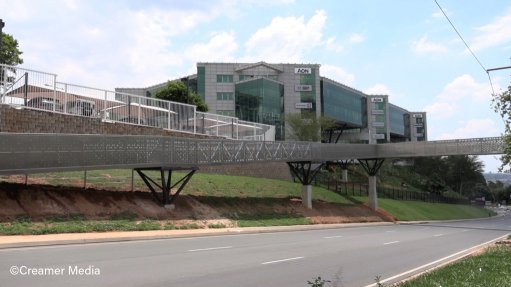Gauteng: a looter’s paradise
Gold has been associated with our neck of the woods since its discovery on a farm just outside the present- day Joburg central business district back in 1886. Thanks to this association, it was not too difficult for our leaders in the early years of the post-1994 dispensation to come up with a name for the then newly created province that is host to Joburg and Pretoria, the seat of the South African government. One bright spark proposed the province be named Gauteng – Sotho for ‘place of gold’ – and all stakeholders apparently nodded their agreement in unison. But the goings-on at schools, municipalities, parastatals and government departments have added a new dimension to the province – it is now a looter’s paradise.
If Corruption Watch is to be believed, Gauteng has the dubious honour of being the ‘crime scene’ of most acts of corruption perpetrated in the country. According to the graft watchdog’s latest ‘Analysis of Corruption Trends’ report, 39.8% of the 2 469 corruption-related complaints it received during the first half of this year were reported in Gauteng. KwaZulu-Natal was a distant second, accounting for 9.6% of complaints, with the Western Cape and the Eastern Cape sharing third place, with 6.5% of complaints apiece.
Gauteng’s municipalities were found to be the most corrupt countrywide, with 20.1% of instances of municipal malfeasance reported in Joburg. Although the city fathers (and mothers) in Tshwane and their underlings are not as venal as their counterparts in the City of Gold, they are not lacking at all in the corruption stakes, accounting for 10.1% of reported cases from January to June. Ekurhuleni, the only other metro in Gauteng, shared third position with the City of Cape Town, with each of the two metros being the ‘crime scene’ of 6% of the reported cases.
But South Africa’s councillors and municipal employees, who were implicated in 9.2% of the cases Corruption Watch was alerted to by whistleblowers, are not the most corrupt lot – that dubious distinction belongs to school officials, including principals and outsiders elected to serve on school governing bodies. Their favourite methodology is to rig procurement processes to favour their cronies, but there have also been cases where funds raised to build laboratories, libraries, sports facilities and suchlike end up lining the pockets of these crooks. Corruption involving schools accounted for 10.8% of the reported cases.
Complaints implicating the police comprised 6.3% of the total, with those targeting licensing centre officials comprising 3.3%. State-owned enterprises and the health sector accounted for 3.1% and 2.7% respectively.
Corruption Watch’s statistics indicate that the most prevalent form of corruption in South Africa is bribery, which accounted for 23% of all complaints during the six months, followed by procurement irregulari- ties (16.9%) and embezzlement and theft of resources (11.3%).
I previously wrote in this column that corruption – especially where it takes place in high places – inflates government’s procurement bill, depriving it of the wherewithal to effectively render public services. It also limits the country’s job creation potential. This seems to be what Ghanaian author Israelmore Ayivor had in mind when he famously said: “You don’t necessarily need atomic bombs to destroy a nation; politicians who value their pockets [more] than the life of citizens always do that every day”. I cannot agree more. But, having read the ‘Analysis of Corruption Trends’ report, I argue that this quote should be tweaked so that public servants – at all levels of government – are mentioned alongside politicians as the villains who are wrecking our countries.
When trade unionist Zwelinzima Vavi tweeted not so long ago that South Africa had lost an estimated R700-billion to corruption since the dawn of democracy, someone dismissed this figure as a “lucky guess”. But, assuming that, in African countries, up to 25% of gross domestic product is siphoned off through corruption each year, as alleged by international anticorruption bodies, then R700-billion over 20-plus years doesn’t seem that far-fetched. Such an amount would make a huge difference to the lives of citizens.
Article Enquiry
Email Article
Save Article
Feedback
To advertise email advertising@creamermedia.co.za or click here
Comments
Announcements
What's On
Subscribe to improve your user experience...
Option 1 (equivalent of R125 a month):
Receive a weekly copy of Creamer Media's Engineering News & Mining Weekly magazine
(print copy for those in South Africa and e-magazine for those outside of South Africa)
Receive daily email newsletters
Access to full search results
Access archive of magazine back copies
Access to Projects in Progress
Access to ONE Research Report of your choice in PDF format
Option 2 (equivalent of R375 a month):
All benefits from Option 1
PLUS
Access to Creamer Media's Research Channel Africa for ALL Research Reports, in PDF format, on various industrial and mining sectors
including Electricity; Water; Energy Transition; Hydrogen; Roads, Rail and Ports; Coal; Gold; Platinum; Battery Metals; etc.
Already a subscriber?
Forgotten your password?
Receive weekly copy of Creamer Media's Engineering News & Mining Weekly magazine (print copy for those in South Africa and e-magazine for those outside of South Africa)
➕
Recieve daily email newsletters
➕
Access to full search results
➕
Access archive of magazine back copies
➕
Access to Projects in Progress
➕
Access to ONE Research Report of your choice in PDF format
RESEARCH CHANNEL AFRICA
R4500 (equivalent of R375 a month)
SUBSCRIBEAll benefits from Option 1
➕
Access to Creamer Media's Research Channel Africa for ALL Research Reports on various industrial and mining sectors, in PDF format, including on:
Electricity
➕
Water
➕
Energy Transition
➕
Hydrogen
➕
Roads, Rail and Ports
➕
Coal
➕
Gold
➕
Platinum
➕
Battery Metals
➕
etc.
Receive all benefits from Option 1 or Option 2 delivered to numerous people at your company
➕
Multiple User names and Passwords for simultaneous log-ins
➕
Intranet integration access to all in your organisation














